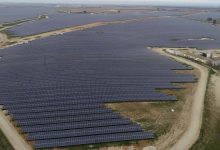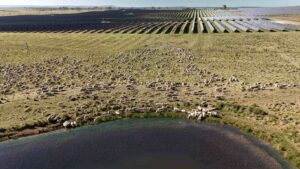In a tough summer for Europe that brought record-high energy prices and sweltering heatwaves, solar power has provided some much-needed relief.
Our analysis published today reveals that record levels of solar power across the EU this summer avoided the need for 20bn cubic metres (bcm) of gas, which would have cost €29bn (£25bn) to import.
The success of solar could help shine a pathway out of the energy and climate insecurity that the EU is currently facing.
Many EU countries have already increased renewables targets in the wake of soaring gas prices and Russia’s invasion of Ukraine, looking to replace expensive gas imports. Upcoming EU-wide policy discussions could mean that solar plays a much bigger role in the future EU electricity system.
Solar record
Europe is currently facing an energy crisis of unprecedented proportions. Russia’s squeeze on fossil fuel supplies is pushing electricity prices into all-time highs, with additional stress caused by nuclear reactor unavailability in France and drought impacting hydroelectricity generation in many European countries.
At the same time, solar has delivered record-high generation across the summer of 2022, helping keep the lights on and reducing the EU’s now critical gas consumption.
As the chart below shows, EU solar generation increased by 28% in summer 2022 (May-August), compared with the same period a year earlier.
Without record solar electricity generation over the past four months, the EU would have had to purchase an additional 20bcm of gas at a cost of about €29bn (£25bn). The new solar electricity added since 2021 alone avoided €6bn (£5bn) worth of gas imports.
During the peak summer months of May to August, solar power generated a record 12% of all the EU’s electricity – up from 9% last summer. That puts it on a level with wind and ahead of hydro, though still four percentage points behind coal power.
Moreover, solar is growing very quickly. The EU has seen consistent 15% year-on-year increases in installed solar capacity – from 104GW in 2018 to 162GW in 2021. The jump in solar generation this summer shows that accumulated capacity paying off.
Fastest growth
Solar’s rapid growth is happening right across Europe. Some 18 EU countries saw solar generate a record share of summer electricity generation.
The Netherlands generated almost a quarter of its electricity from solar power this summer (23%), the highest share in the EU. Germany (19%) and Spain (17%) are following close behind.
A mix of cost incentives and government initiatives are behind solar’s growth. The fact that both southern and northern European countries are expanding solar shows that it is not just sunshine that matters, but also effective policy.
The Netherlands, for instance, has seen huge solar growth – despite being at a higher latitude – underpinned by ambitious national targets.
The fastest growth in solar generation since 2018 was in Poland. The country increased solar generation by 26 times – although from a low base – as a result of a boom in rooftop solar for households triggered by PV subsidies and increasing prices for coal- and gas-driven electricity.
The chart below shows the top electricity-consuming countries in the EU. Most of them broke solar output records, reaching higher solar shares this summer (red dot) compared to last summer (the grey dot). Two new countries broke the 10% share mark this summer: Belgium and Denmark. Across all 27 EU member states, 18 countries broke solar records this summer.
Some evidence suggests that the energy crisis is speeding up the growth of solar.
Consumers across Europe, from Germany to the UK, are turning to solar panels to help bring down their energy bills.
Google Trends reveals that search terms related to solar panels reached a record-high this summer across major economies such as Germany, the UK, France and Spain.
With the International Energy Agency (IEA) having declared that solar in the right locations now offers the cheapest electricity in history, its rapid growth looks set to continue.
Paweł Czyżak is a senior analyst at the energy and climate thinktank Ember.
This article was originally published by Carbon Brief, republished here under a CC license. Read the original article here.







